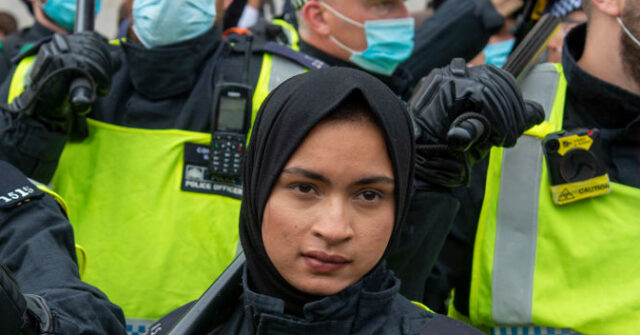Ruby Begum, a 29-year-old police constable of Bangladeshi heritage, is set to face a misconduct hearing later this month following allegations of making offensive comments online and having associations with a female jihadist linked to the Islamic State. Originally celebrated as a “role model” for her actions during the anti-lockdown protests in 2020—where she was seen courageously confronting demonstrators while donning her hijab—Begum’s career has since faced scrutiny. The three-day hearing from October 21st-23rd will address potential breaches of professional conduct, particularly focusing on her social media behavior and potential deception during the vetting process for her police role when she joined the Metropolitan Police in 2016.
The Metropolitan Police has raised significant concerns about Begum’s failure to disclose her alleged contacts with a jihadist living within the Islamic State caliphate in Syria. Investigators will evaluate whether she hid the details regarding her associations and claims of interest in extremist ideologies when she applied for the police force. A statement from the police indicates that these concerns around her integrity and kettle public trust will play a critical role in the upcoming hearing. The focus on her social media activity has revealed a pattern of discriminatory comments that could further tarnish her image and that of the police force.
Begum’s earlier reputation was rooted in her public display of bravery and determination to uphold the law, highlighted by her presence amidst politically charged and tumultuous protests. During the pandemic, she emerged as a symbol of female empowerment in policing, which made the subsequent revelations about her questionable online behavior all the more striking. Media reports from 2021 unearthed various tweets that hinted at extremist views, including derogatory references to Jews and non-Muslims, further complicating her narrative as an inspirational figure within the police. The ongoing investigation into her past interactions with radical ideologies raises troubling questions about the vetting processes in the Metropolitan Police, prompting calls for accountability.
The spectrum of Ruby Begum’s social media activity is vast; she has expressed controversial opinions regarding various events, including the September 11 terrorist attacks and the Holocaust, and she reportedly continued to share these sentiments even while serving as a police officer. While some posts demonstrate her disapproval of ISIS and its actions, the prevailing messages have contributed to a perception of her harboring extremist sympathies—a label that poses significant reputational risks for both her and the Metropolitan Police when assessing which candidates to put on the job.
Additionally, the incident represents an ongoing challenge for the Metropolitan Police, which has faced increasing scrutiny over its internal management and recruitment strategies. The failure to identify potential issues during the hiring of an officer celebrated for her diversity could invite questions about the vetting procedures that are meant to screen out candidates potentially sympathetic to radical ideologies. With instances of misconduct and wrongdoing among its ranks surfacing in recent years, the police department must grapple with both internal accountability and public trust amid growing concerns over officer conduct.
This unfolding situation underscores a larger ongoing dialogue regarding diversity and representation within British policing, as well as the balance between individual beliefs and professional responsibilities. Regardless of the outcome of her hearing, Ruby Begum’s case serves as a reminder of the weighty expectations placed upon police officers, particularly those who break barriers of representation within the force. The decisions made in response to these allegations will likely influence future discourse on policing, particularly concerning the standards of integrity, accountability, and public trust that officers are expected to uphold.

